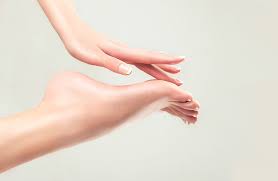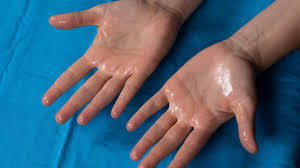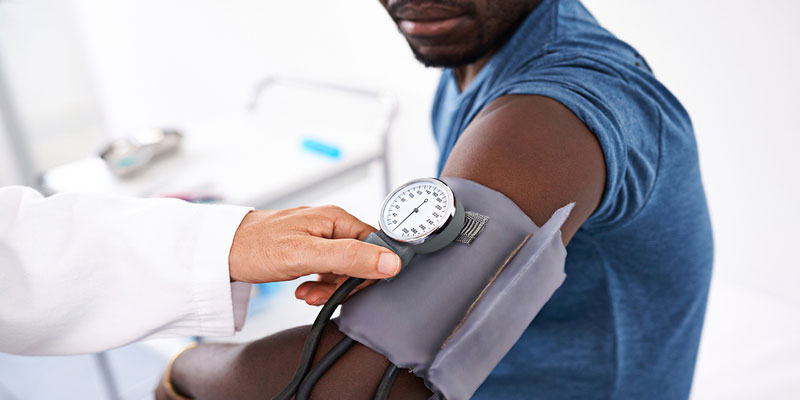Generalized hyperhidrosis, which often affects adults, is characterized by excessive sweating that occurs not only in one area of the body but rather over the whole body. There is evidence to indicate that persons with hyperhidrosis have a hyperactive sympathetic nervous system. An active sympathetic nervous system triggers your body's fight-or-flight reaction. Because of this excessive activity, the body produces more sweat than is normal.
The condition known as generalized hyperhidrosis is sometimes referred to as secondary hyperhidrosis. In most cases, the illness is "secondary" to another, more significant health issue that is the primary cause of excessive perspiration. Hyperhidrosis affects around 5% of the population in the United States. According to a piece of research presented in the Archives of Dermatological Research in the year 2016, the majority of these individuals have primary focal hyperhidrosis.
Symptoms
Generalized hyperhidrosis is characterized by several signs and symptoms, the most prominent of which is excessive sweating.
- A condition in which extensive body areas, as opposed to particular body parts, such as the hands or feet, are perspiring.
- Excessive perspiration for what seems to be no cause
- Sweat during sleep
- Some individuals may feel embarrassed due to excessive perspiration, which may have negative implications on their mental health. Infections of the skin are another potential complication of generalized hyperhidrosis.
Causes
Generalized hyperhidrosis does not have a single identifiable root cause. In most cases, excessive sweating results from a preexisting medical condition or a negative reaction to a prescribed prescription.
Medical Conditions
A wide variety of medical disorders might bring on excessive perspiration in certain individuals. The American Academy of Dermatology Association (AAD) lists the following among the conditions that fall within this category:
- Diabetes
- Frostbite
- Gout
- Injury
- Menopause
- Obesity
- Overactive thyroid
- Tumor
Medicines
Generalized hyperhidrosis is a side effect of many drugs, both over-the-counter (OTC) and prescription drugs.
How Is Generalized Hyperhidrosis Diagnosed?
If you are sweating excessively, your healthcare professional may want to evaluate whether the sweating is caused by an underlying ailment or a drug you are taking.
Your medical history will most likely be examined, and you will also be subjected to a physical examination. In addition, they may ask you questions about the circumstances surrounding your sweating, such as the following examples:
- The areas of the body that sweat
- The time of day when you feel the most heat
- What causes you to start sweating?
- If you are experiencing further symptoms
- Any potential medicines or supplements that you could be taking, including over-the-counter pharmaceuticals and vitamins.
If a medical professional has reason to believe that the sweating you are experiencing is secondary, they may recommend that you undergo blood testing or imaging tests to rule out possible reasons.

How To Treat Generalized Hyperhidrosis
According to Dee Anna Glaser, if you have generalized hyperhidrosis, your therapy can focus on any underlying health issues, drugs, or supplements. It is common sense that it is not always feasible to stop sweating when an underlying medical problem causes it. Therefore, specialized therapies are available for hyperhidrosis, some of which are shown below.
Antiperspirants
Antiperspirants, particularly those containing 10–20% aluminum chloride hexahydrate, are often one of the first lines of defense used. Antiperspirants work by blocking the sweat ducts in the underarms.
Your healthcare physician may suggest picking up an antiperspirant from the drugstore. Depending on the extent of your sweating, they may also prescribe a more potent solution for you to use.
Keep in mind that some products might cause skin irritation, so follow the directions on the package when you use them. If you see any changes to your skin, you should inform a healthcare expert.
Prescription Medicines
Oral medicines, such as anticholinergic or beta blockers, may be prescribed by a healthcare professional to reduce the sweat a patient produces. On the other hand, these drugs might cause adverse effects and may not be the most effective treatment option for generalized hyperhidrosis over the long run.
Prescription Cloth Wipe
In most cases, you should only need to use prescription cotton wipes beneath your arms once every day. However, these wipes could have some adverse effects, such as leaving your mouth dry or causing skin irritation.
Living With Generalized Hyperhidrosis

If the underlying reason for the sweating cannot be addressed (for example, a health condition, a prescription, or a supplement), it may be difficult to remove the problem. However, there are several things you can do to cut down on the amount of sweat you produce. One possible solution is switching to an antiperspirant rather than relying on deodorant. Deodorant may cover up unpleasant body odor, but it won't stop you from sweating.




